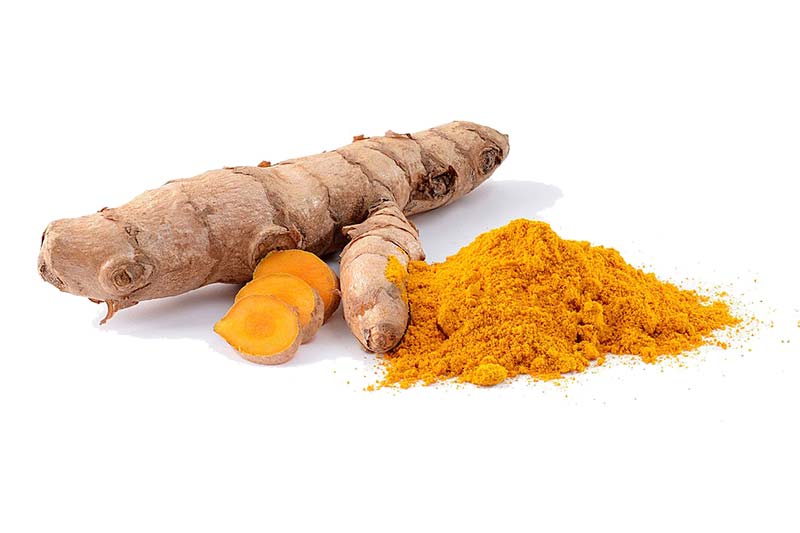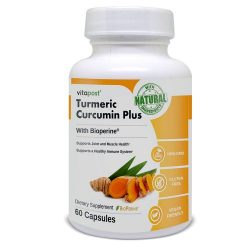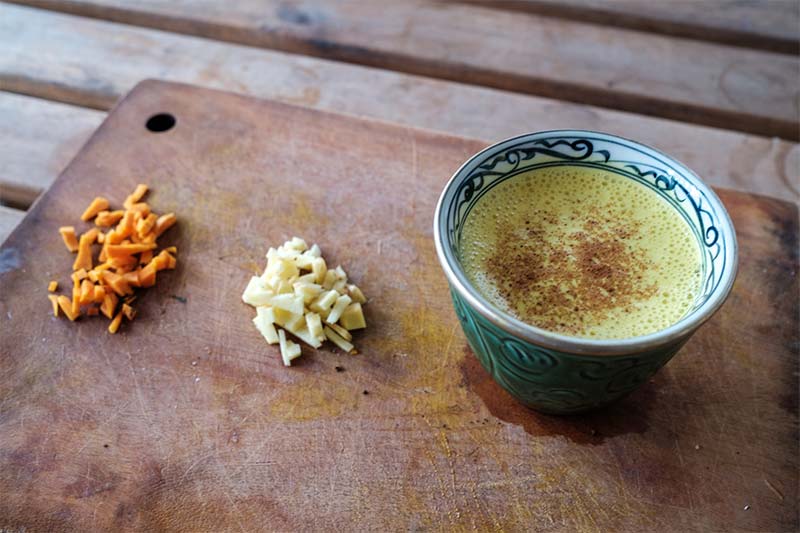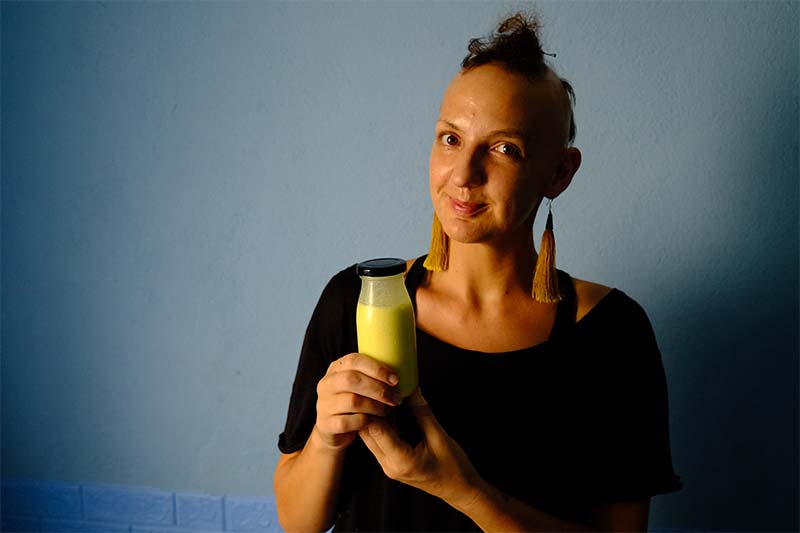

Turmeric, or curcuma longa if you want to get fancy, is a member of the ginger family. (Hey, me too! At least, I was before I lost my hair.)
It contains a plant-based chemical called curcumin, which gives it that lovely yellow colour. Turmeric has plenty of health benefits, but the one you hair lossers might be MOST interested in, is turmeric for hair growth.
It’s taken a while for the West to realise the amazing health benefits of turmeric. But we’re getting there. And whether you enjoy this warming spice in a ‘golden latte’, add it to your salad dressings or sprinkle it in a smoothie, you can’t go wrong with more turmeric in your diet.
Especially when you can use turmeric for hair growth, the natural way.

Emma’s ‘not a doctor’ disclaimer
Hi there, I’m an alopecian, I’m not a doctor! Any advice I give is based on my own research and personal experiences. This site is however reader-supported. When you buy through external links, I may earn a tiny affiliate commission. Learn more here.
Even though it’s best in raw form, you mightn’t like the taste (or the stained fingers!) So real quick, here’s a few turmeric-based goodies as natural remedies for hair loss.

The curcuma longa plant is native to India, which produces nearly all of the world’s turmeric crop and consumes 80% of it – although turmeric is now popular across Asia, Africa, and the West, too.
To make “cooking turmeric” the root of the plant (the rhizome) is boiled, dried in the sun and ground into a bright yellow powder – known as “Indian Saffron” thanks to this vivid color, plus its high value. (Luckily, this nutritional and medicinal value doesn’t mean a high price tag!)
If you’re a fan of Indian food, you’ve had this kind of turmeric before. Still, while it adds colour, flavour and fragrance to dishes, turmeric’s talents go waaaay beyond a tasty curry.
In fact, turmeric has been used in ayurvedic and other traditional medicine practices for centuries. Although relatively new to Western medicine, it’s one of the few natural remedies that’s crossed over to be widely accepted by doctors: to help conditions like arthritis, irritable bowel syndrome, depression and even some forms of cancer. (Although turmeric for pain relief is still one of the best-known benefits.)
Note:the name “curcumin” is often used interchangeably with turmeric. But there’s a distinction: curcumin is found inside the rhizome (root) of the larger plant. It’s a polyphenol, and the main component responsible for turmeric’s antioxidant, anti-inflammatory properties.
There’s LOTS to love about turmeric, and I’ll get into its many health benefits soon. But first: how can it help your hair?
When we look at the reasons for hair loss, there’s often a few at play: an autoimmune response triggered by harmful bacteria, skin conditions like psoriasis or dermatitis, hormonal imbalances like thyroid issues, or chronic inflammation provoked by stress, diet and environment.
Turmeric can tackle ALL these elements. It keeps your immune system strong and reduces the chance of hair loss in the first place. It also widens blood vessels to improve circulation throughout the body – including the scalp.
Now, let’s look at 3 top benefits turmeric brings to your hair. They all begin with “anti”. How nice.
Curcumin, that vital part of turmeric, attacks inflammatory mediators – the compounds that cause pain. Which is good news, because when these mediators stay put, we get chronic inflammation or illness. Like the kind of persistent hair loss an alopecian knows all about.
Sometimes inflammation is necessary – it helps us fight viruses and allows skin cells to heal. If you’ve ever had a bad burn or a cut you’ll know that swelling/inflammation is an important part of the healing process. So short-term inflammation is good. In the long-term, chronic kind of way…not so much.
Turmeric is a natural anti-inflammatory whose properties match even those of potent anti-inflammatory drugs…without bad side effects. So if you’re using prescription drugs or topical lotions as a remedy for scalp conditions or irritated skin – turmeric oil or even oral turmeric supplements is a more soothing approach.
In clinical animal tests, turmeric proved to lower oxidative stress. And as we know, any kind of stress – internal or external – is a key factor in hair loss. Turmeric works to reduce stress in the body and when taken regularly, e.g. in supplement form, can even prevent it in the first place.
Antioxidants also boost hair growth by strengthening collagen (the hair follicles’ connective tissue) and proteins like keratin. A good antioxidant also protects scalp cells to promote healthier hair. In Unani medicine – that’s the name given to Perso-Arabic Traditional Medicine – practitioners use turmeric to open blood vessels and boost blood circulation. Giving turmeric users a scalp rich in circulation and fuller hair!
Turmeric’s antibacterial and antimicrobial applications make it popular in both traditional and modern medicine. In the hair care industry though, it’s favoured as an invigorating exfoliator and cleanser – one that removes excess sebum and cleans the scalp, plus hair follicles, in a super-gentle way.
As a natural antiseptic, turmeric’s also perfect for tackling light dandruff or soothing an itchy, flaky scalp (associated with conditions like seborrheic dermatitis). Like I always say, the scalp is the foundation of the hair. So a healthy, nourished scalp is the gateway for healthy hair that grows long ‘n’ strong!

We’ve seen how turmeric helps hair growth. But it can ALSO prevent thinning hair or hair loss in the first place. How? Because it inhibits DHT (dihydrotestosterone) – the byproduct of testosterone that trichologists, dermatologists and immunologists alike link to hair loss.
The most common kind that DHT causes is male pattern baldness, or androgenetic alopecia (AA). This occurs when the hair follicle gets mixed messages from its receptor, after which it shrinks and refuses to grow new hair. Bummer.
Many hair loss products block a specific enzyme (5a-reductase) from converting testosterone into DHT. But in doing so, they sometimes contain a lot of other chemicals, with bad side effects like in the case of oral finasteride. Curcumin, on the other hand, helps block DHT in a natural way.
LA Says: I can’t find specific research that explains how exactly curcumin blocks DHT – but I do know that other natural products, like green tea, saw palmetto and caffeine manage to do it, so I’m guessing it’s a similar process!
Studies show the beneficial effects of turmeric are achieved through dietary consumption, even at low levels, over long periods of time. So unless you cook with turmeric at every meal – or mix it in a drink every day – you mightn’t be getting all its benefits.
That’s why I strongly recommend taking a turmeric/curcumin supplement, to really take advantage of those nutritional properties.
Turmeric supplements are BY FAR the easiest way to get all the anti-inflammatory and immune-boosting properties of curcumin – without turning your scalp yellow!
LA Says:Curcumin and turmeric pills are actually one of the most popular supplements around for boosting health. No harmful side effects: just a stronger immune system, more energy, better brain function and healthier skin/hair…who doesn’t want those things?!
This brand takes all the goodness of turmeric and BioPerine (more on that in a sec!) and adds a little extra: ginger.
I loooove ginger – I love eating it, I love drinking it in my tea and I even love smearing the raw stuff on my bald patches! FYI, it’s a great way to boost scalp circulation and can encourage growth without staining your head! So when I heard about a turmeric curcumin pill that had ginger, too? Well, I was sold!
Reviewers love this double superfood offering. They use it to ease joint pain and digestive issues – one reviewer also mentions how ordinary turmeric capsules gave him stomach cramps, which the ginger in this brand prevented from happening.

Like Turmeric Curcumin Plus (coming up!), VitaPost makes this product in an FDA-registered facility in the US that follows GMP guidelines. Good to know. Oh, and you can get 5% off when you enter this code upon checkout: FIVE$39532113. Even better to know!
These turmeric curcumin supplements, also from VitaPost, include BioPerine. Which is a peppercorn extract that the manufacturer states “is the only product sourced out of piperine to obtain a patented status for its ability to increase the bioavailability of nutritional compounds.”
In English? It helps you absorb curcumin faster. Because when you take turmeric by itself, it has a “low bioavailability” – meaning the body can’t absorb it easily.
So particularly when supplementing, you need something else to improve your absorption of curcumin. In this case, it’s BioPerine.

The final ingredients are curcuminoids, which support the immune system, cognitive function and joint health. The curcuminoid most commonly associated with these benefits is none other than curcumin – remember, it’s not the same thing as turmeric, but its most beneficial compound. The great thing about these supplements is they contain turmeric AND curcumin, plus the BioPerine that helps you absorb it.
And yes, these turmeric pills are also made in the US, in an FDA-registered facility that follows GMP (Good Marketing Practices) guidelines. Reviewers comment about the superior quality of this brand and how great they feel (less joint pain, lower blood pressure, even weight loss) after trying them out.
Interested? Well, good news: Lady Alopecia readers get 5% off their online order. Just enter the code: FIVE$39532113 at checkout. Enjoy!
Full disclosure: I’d never even heard of turmeric essential oil before writing this post! I usually try to have it in my diet instead, either with fresh turmeric root, store-bought powder or turmeric/curcumin supplements.
But since researching the various oils out there, I’m curious to try turmeric oil, too. You may already know, I’m a fan of natural oils for hair loss – so I may just have to add this one to my list!
According to this NCBI article, the “neuroprotective activity of curcuma oil…is associated with its antioxidant activities. Curcuma oil appears to be a promising agent for disorders associated with oxidative stress.”
And we alopecians should always seek to lower oxidative stress, whenever possible. Because it leads to hair loss. No, thanks.
This curcuma essential oil by Plant Therapy gets a lot of great Amazon reviews. 100% pure and organic, you can use it to ease period pain, joint swelling or inflammation, as a face mask ingredient, to soothe muscular tension or – you betcha – to stimulate hair growth. One customer adds it to argan oil for extra hair conditioning while another prefers coconut oil as a carrier. Most of the reviews rave about the quality of the brand, and mention how – thankfully – the oil doesn’t stain.

Like I mention in this post about aloe vera, I recommend going to the source first. And the BEST way to enjoy turmeric’s health benefits is to include the raw stuff in your diet.
But even though fresh turmeric is great for lowering internal inflammation/stress, it’s not so great when applied topically – unless you dilute it. Because a piece of fresh turmeric, which looks very similar to ginger, is pure orange inside. And very, very stainy. The same goes for the bright yellow powder you’ll get in the supermarket or grocery store – amazing for adding as a cooking spice but I wouldn’t be rushing to spread it on my head!
FYI, I’ve used turmeric in homemade face masks before. I looked a bit like a Simpsons character but luckily, the tinge faded soon after and my skin glowed… y’know, in a good way! I ruined my face cloth, though. Oh well.
If you’re nervous about using fresh turmeric on your head, I’d recommend doing one of the following instead…
LA Says:When I remember, I drink turmeric with fresh ginger, mint leaves, lime and hot water in the morning (mmm!) Or I’ll go all decadent with this “Golden Milk” recipe. But I don’t do it regularly enough to make a massive difference to my immune health, or my hair loss, for that matter. Daily turmeric supplements are a better way of ingesting the necessary amount of curcumin to see real results.
It’s got all of that hair-growing potential, plus so much more. I won’t go into TOO much detail about the many health benefits of turmeric and curcumin because frankly, there’s tonnes of information out there on this very subject!
But for a quick overview, here’s what else turmeric can do:
Whether it’s a scrape from your cat, a rash from your ‘genuine leather’ jacket or a sprained elbow from your Zumba class, turmeric can be your salve ‘n’ saviour! Good ol’ curcumin’s anti-inflammatory properties can match those of prescribed medication (without the side effects). These same properties can be applied to treat longer-term conditions like arthritis.
If you suffer from allergies, turn to turmeric! Whether you get sinus pain or migraines from your environment, turmeric’s strong antimicrobial properties helps it inhibit histamine-producing bacteria. Now, according to this article, clove and cinnamon are even more effective but still, it’s a good benefit. And much more comfortable than a Neti Pod. 😉
It’s no secret that turmeric can brighten and even out skin tone. Modern cosmetics that use turmeric drawn on the “haldi” ceremony from India – a pre-wedding tradition that involves applying turmeric paste to bride and grooms’ faces for a lovely Big Day glow.
In Ayurvedic medicine, turmeric is used to treat a variety of conditions like asthma and sinusitis. Unani practitioners use turmeric regularly to expel phlegm from the body. Gross.
If you decide to try turmeric supplements, make sure you take them BEFORE food. Because it’s a powerful digestive stimulant which can help to – ahem – get things going if you’re stuck!
Diet not been so good lately? Turmeric can clean it up. It’s got lots of antioxidants to protect your body from reactive molecules known as “free radicals”. These bad guys pose a big health risk because they attack healthy cells and proteins – including your hair follicles, FYI.
What causes free radicals? Oh, a bunch of things – cigarettes, alcohol, a poor diet, antibiotics or environmental factors like UV rays and metal exposure. Curcumin (and turmeric, as a result) neutralizes free radicals to stop their effects in their tracks.
Our “brain growth hormone”, known as BDNF, helps us form new connections between neurons. It’s what keeps us sharp, curious and less likely to develop mental illnesses like depression or degenerative diseases like Alzheimers.
Curcumin is now linked to increasing BDNF levels in the brain – to delay or even reverse the effects of deficiency. While turmerone (also contained in turmeric) has been shown to support cognitive performance. So can turmeric make you smarter? Yes, it can!
In its many centuries of use as a natural remedy and spice, turmeric has been viewed as safe to use. No studies – in animals or humans – have found any toxic effects of turmeric, even in high doses. Plus, the FDA has declared turmeric and curcumin as GRAS (generally regarded as safe).
Still, if using turmeric or curcumin supplementation, I’d stick to what they recommend on the label – the ones I link to in this post say one tablet, twice a day. If you’re on other medication, check with your doctor first. And if you’re pregnant or breastfeeding, check with your doctor, too.

Ayurveda is an Indian system of holistic medicine that uses plant-based treatments for various ailments – under the belief that nature is our best asset. Natural remedies are said to be the best for offering results that don’t distress the body. I like this approach, very much!
Turmeric has strong roots in ayurvedic and other traditional medicines. In fact, it dates back nearly 4000 years, to the Vedic culture in India. Back then, it was used to relieve the effects of food poisoning, to boost energy, relieve gas, dispel worms, regulate menstruation, soothe arthritis and much more. In Southeast Asia, it was used as an antiseptic for cuts, burns and bruises.
Basically, cultures all around the world have used turmeric for a tonne of different medicinal purposes (like digestive, anti-inflammatory and anti-bacterial support), as well as topically for the skin. And today? Its uses have extended to antioxidant, cholesterol and cardiovascular support – very much needed in our fast-paced, stressful lives.
In summary: Turmeric isn’t just an old wives’ tale. It’s a ‘golden spice’ that’s stood the test of time – as modern medicine has begun to appreciate its healing capabilities, too. In fact, over 3000 publications dealing with turmeric have been published within the last 25 years! And I’m happy to see it getting the credit it deserves.
You can get fresh turmeric root or turmeric powder from your local grocery store. But for higher concentrations of curcumin – the stuff with all the healing properties – it’s best to try the daily supplements.
You betcha. No side effects or toxicity has been reported from ingesting even large amounts of turmeric.
Great question. It’s a tricky one, especially if you’re cutting up raw turmeric root. I’d recommend wearing latex gloves or at the very least, scrubbing your fingers with warm soapy water immediately. Or get it into your diet in pill form instead! 😉
I’ve gushed about all the many health benefits of turmeric in this post. As you can see, there are LOTS – not just for your physical and mental health but for cosmetic health, too…including great hair and skin!
There are no bad side effects, it’s cheap to buy the spice or turmeric supplements and it can make a real, lasting positive impact in your life.
So give turmeric a try – and as always, I’d love to hear about your experience in the comments box!
Get free, semi-regular alopecia-related news things and musings.
Psst… If no welcome email shows up, check your spam.

Alopecian. Yoga Teacher. Copywriter. Here to share information, offer support and show people the adventures that can lie in hair loss. I’m proud to have alopecia and I want to help others embrace their baldness, too!





Every month, thousands with hair woes visit my site. The more the merrier! But it takes AGES to write posts and reply to emails. Don’t get me wrong, I love it! But running a website isn’t free. So I’m trying something new: I’m asking for your support. If Lady Alopecia has helped you, please consider buying me a (virtual) coffee or even become a patron of the site. Thanks!
I’m Emma. I’ve had alopecia for 24 years and I’m here to inform/hopefully empower people like me! Read my full story here. But I’m not a doctor, so any advice here is based on my own research and experience. I’m also in a few affiliate programs – see my disclaimer page for more. Or contact me here. Also, why not join a thousand fellow alopecians and get my-semi regular hair about life with irregular hair?
Psst… If no welcome email shows up, check your spam.

Small print time: Ladyalopecia.com is a participant in the Amazon Services LLC Associates Program, an affiliate program designed to provide a means for sites to earn advertising fees by advertising and linking to Amazon.com.
Copyright © 2023, Lady Alopecia. All rights reserved. Important – By using this website, you promise not to steal stuff. Thank you kindly.
Join the gang and receive semi-regular news and joy from someone with very irregular hair.
4 responses
Thank you so much Emma. Merry Christmas to you and your family! 🙂 xxx
And same to you!! Have a wonderful New Year also. 🙂
Hi Lady Alopecia ( or do you prefer Emma 🙂 ). Congrats on the new baby coming!!! Hope you are both well. I have been an admirer of your work here for awhile now and have been meaning to introduce myself.
I’m Mary I also started a blog because I have rosacea (a skin disorder) but I blog about all things skin. So I have landed on your site quite a bit doing research for my own articles about this subject. I also have you listed on my Skin Support Group page (hope this is ok) for morale support with this condition. You are quite a celebrity on my site! 🙂 Wish you well and please give me a plug. Thanks.
https://allaboutourskin.com
Hi Mary,
Thanks so much for your kind words and for the congratulations also! My baby girl (Sunny) is doing very well, thank you. 🙂
Congrats also on your blog! I’ve found that writing about my condition has helped me so much…I’m delighted you’ve found an outlet for rosacea also, and have created this platform to help others. As asked, I have linked to your website below. 🙂
I hope you have a wonderful day and take good care! Emma xxx